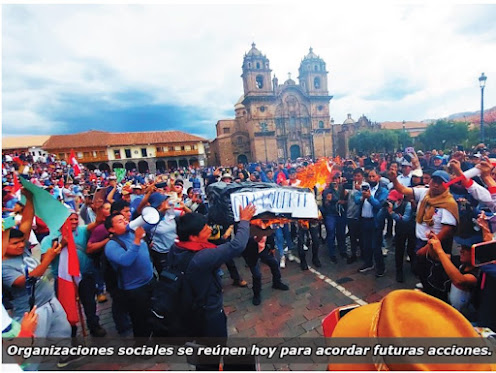'Marches for Peace' Promoted by Government and Police Activists (La República [Spanish] - 1/2/2022)
'Marches for Peace' Promoted by Government and Police Activists (Spanish)
Marches that oppose protests against the Peruvian Government are called by the National Police (PNP). Specialists warn against the political use of an institution that must guarantee the rights of all citizens including the right to protest.
David Pereda
A mobilization called the "march for peace", which oppose protests that reject the Government are about to resume and are promoted by the Executive Power itself with active support from the PNP, has generated controversy.
President Dina Boluarte announced these so-called peace marches, which are planned in opposition to the demonstrations calling for her resignation, in addition to the holding of new general elections and the closure of Congress.
"Just as there are people who are saying that they are going to march on January 4, there is also a group of people who want peace and are going to march for peace in Peru," said President on Friday in Cusco, where she went to meetings to try to reduce the protests that are getting ready.
Boluarte supported these mobilizations that would appeal for peaje let's embrace together those of us who want to march peacefully, those who are going out to march for peace to build Peru (...), to meet again among men and women who, really, love Peru," said the President.
Shortly after, the PNP summoned citizens to participate in a march for peace that will take place Tuesday, January 3rd in different regions of the Country. That is, one day before several protests against the Boluarte government are resumed, as agreed by various social organizations in Peru.
"We invite you to be part of this great march for peace that will take place in the main squares of cities nationwide," the PNP published on Twitter and announced that in Lima the concentration point will be in Campo de Marte and will be traveled to Plaza San Martín, a space previously used by supporters of former President Pedro Castillo and which has been closed in recent weeks.
Peruvian National Police General José Arriola came out on video to call people to join the march.
"We invite the brothers of all the churches, merchants, workers, housewives, family members, transporters, workers, teachers and students to put on a white garment that signifies peace and march", the officer said in the video.
The involvement of the PNP has been widely criticized.
“One of the institutions that needs more neutrality is being politicized. Aligning a state institution like this to a political bloc that defends the Government is what authoritarianisms do,” says sociologist Omar Coronel, a professor at the Catholic University (PUCP).
“The job of the Police is not to organize marches, but to guarantee rights, including the right to citizen protest against the Government. The fact that the State organizes marches distorts its contentious meaning”, considers the sociologist Noelia Chávez.
Reactions
Omar Colonel. Sociologist, PUCP
“One of the institutions that needs more neutrality is being politicized. Aligning a state institution like this to a political bloc that defends the Government is what authoritarianisms do”.
Noelia Chavez. Sociologist, Bridge
“The job of the Police is to guarantee rights, including the right to protest. The fact that the State organizes marches distorts its contentious meaning and becomes a questionable populist instrument”.
Carlos Basombrío. Former Minister of the Interior
"No officer of the Police or the Armed Forces should make calls, even if they are for peace, because that corresponds or should have been done by the political authority, not by an officer in office."
Tags: #March for Peace #Dina Boularte #Peruvian National Police #La Resistencia





Comments
Post a Comment